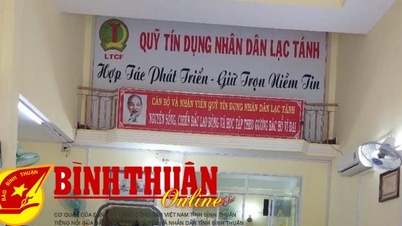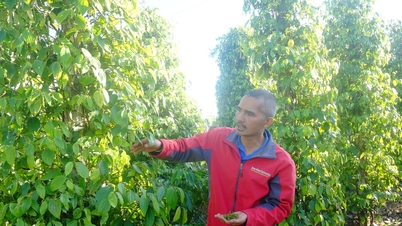Many state-owned enterprises are slow in divestment.
In a report to the National Assembly on the results of the implementation of the questions, Governor of the State Bank Nguyen Thi Hong said that in recent times, the State Bank has made efforts to perfect the legal framework and drastically implemented many solutions to control cross-ownership, excessive share ownership, lending and investment activities that are not in accordance with regulations and promote the restructuring of credit institutions. An important highlight in this process is that the Law on Credit Institutions (amended in 2024) has added many regulations to strengthen supervision and prevent illegal manipulation and control in credit institutions.
The State Bank continues to issue specific instructions, requiring credit institutions to handle cross-ownership between banks and related individuals and legal entities, and at the same time overcome the situation of credit institutions contributing capital and purchasing shares exceeding the limit ratio at other credit institutions.
Up to now, cross-ownership in the banking system has been gradually controlled and significantly reduced. In particular, cases of commercial banks owning shares in other credit institutions exceeding 5% of charter capital with voting rights have been basically handled.
However, one of the notable problems is that shareholders and related parties – especially state-owned enterprises and large economic groups – are still holding a percentage of shares exceeding the legal limit at a number of commercial banks.
This not only violates the principles of sound financial management but also negatively affects the process of restructuring the banking system towards transparency and efficiency. Many state-owned enterprises have not yet divested as directed, leading to state capital being "stuck" in the financial and banking sector, instead of being focused on the main business lines.
In reality, handling cross-ownership and requiring shareholders who are state-owned enterprises to divest capital from commercial banks is not only the task of the State Bank but also involves the coordination of many other ministries and branches such as the Ministry of Finance, the State Capital Management Committee at Enterprises, the Ministry of Planning and Investment, etc.
This coordination needs to be tight, synchronous and have strong enough sanctions to force relevant units to seriously implement. Otherwise, the situation of “playing football and blowing the whistle at the same time”, group interests and systemic risks in the banking sector will likely recur.
In response to the need to restructure the economy and increase the efficiency of state capital use, promoting state-owned enterprises to divest from the banking sector is an inevitable step. It not only helps to clarify ownership and ensure the safety of the financial and banking system, but also contributes to improving the efficiency of public investment and avoiding loss and waste of national resources.

Big loophole in cross-ownership management
The situation of "standing in the name of others" in the ownership of shares at credit institutions continues to be a difficult problem, without a fundamental and thorough solution. This is considered one of the serious loopholes in the management and supervision of cross-ownership - a phenomenon that has caused many consequences for the banking system in the past.
Regarding the detection, prevention and handling of cross-ownership, as well as illegal manipulation and control in credit institutions, the Governor of the State Bank admitted that, despite many efforts, in reality, there are still numerous difficulties, especially in cases where major shareholders deliberately conceal their ownership relationships by asking others - individuals or legal entities - to stand in their names for shares.
This behavior not only aims to circumvent legal regulations on ownership ratio limits, but also creates conditions for manipulating bank operations to serve group interests, reducing transparency and publicity in operations and risk management.
Notably, identifying and handling "standing in for others" behavior is almost impossible based on conventional monitoring measures alone. The mechanism for detecting this behavior currently depends largely on the investigation and verification activities of competent authorities, such as the police and financial investigation agencies.
In addition, the determination of ownership relationships between enterprises is also facing many limitations. The main reason is the fragmented and opaque nature of information related to ownership, especially in the context that many enterprises are not public companies, so they are not obliged to fully disclose information.
This makes it difficult for the State Bank to proactively and accurately look up and verify ownership information. The situation becomes even more complicated as financial transactions, share purchases and sales, and capital transfers are becoming increasingly sophisticated and rapid, thanks to the strong development of the stock market, finance, and technology.
Faced with that challenge, the State Bank said it will continue to strengthen inspection and supervision of credit institutions, focusing on key issues such as: share ownership, capital contribution activities, share purchase and transfer, credit granting to large customer groups, corporate bond lending, etc. These inspection activities will be carried out periodically or suddenly depending on market developments and signs of risk.
In addition to current supervision work, the State Bank is also researching and reviewing to propose amendments and supplements to legal regulations related to share ownership at credit institutions, in accordance with the Law on Credit Institutions 2024.
The goal is to build a tighter legal framework, strong enough to prevent disguised cross-ownership and other forms of legal evasion through "standing in for others", to ensure the health and stability of the financial and banking system.
Source: https://baodaknong.vn/ngan-hang-nha-nuoc-chi-ra-nhieu-vuong-mac-trong-xu-ly-so-huu-cheo-251900.html



![[Photo] General Secretary To Lam arrives in Minsk, begins state visit to Belarus](https://vphoto.vietnam.vn/thumb/1200x675/vietnam/resource/IMAGE/2025/5/11/76602f587468437f8b5b7104495f444d)
![[Photo] General Secretary To Lam meets and expresses gratitude to Vietnam's Belarusian friends](https://vphoto.vietnam.vn/thumb/1200x675/vietnam/resource/IMAGE/2025/5/11/c515ee2054c54a87aa8a7cb520f2fa6e)

![[Photo] General Secretary To Lam concludes visit to Russia, departs for Belarus](https://vphoto.vietnam.vn/thumb/1200x675/vietnam/resource/IMAGE/2025/5/11/0acf1081a95e4b1d9886c67fdafd95ed)


















![[Photo] National Assembly Chairman Tran Thanh Man attends the Party Congress of the Committee for Culture and Social Affairs](https://vphoto.vietnam.vn/thumb/1200x675/vietnam/resource/IMAGE/2025/5/11/f5ed02beb9404bca998a08b34ef255a6)






























































Comment (0)